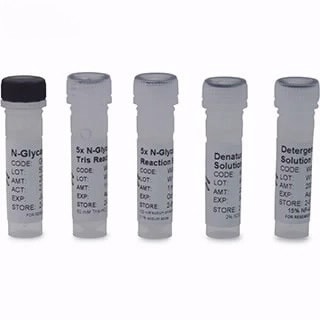
Endoglycosidases
Agilent Endoglycosidases release oligosaccharides from glycoproteins and some other substrates. These enzymes are useful for deglycosylating glycoproteins prior to analysis, or for releasing N-glycans for labeling and analysis. Useful in N-glycan analysis, Agilent offers PNGase F, an asparagine amidase that releases intact N-glycans. PNGase F cleaves between the innermost GlcNac of the N-glycan and the asparagine (Asn) residue of the peptide to which the N-glycan is linked
- Glycobiology Enzymes for N-Glycan Workflows
This product is not available for purchase by the general public.
Product Details
Features
- These products are most commonly used to remove glycans for analysis, or to obtain deglycosylated proteins for analysis.
- Notable among these these is PNGase F, an asparagine amidase that releases intact N-glycans by cleaving between the innermost GlcNAc of the N-glycan and the asparagine (Asn) residue of the peptide the N-glycan is linked to.
Literature
- Key Literature
-
Complete N-Glycan Workflow Solutions
Agilent offers tools and support for every step of your glycan sample preparation and analysis workflow.
- Flyers
- English
- 09 Oct 2024
- 387.09 KB
- Brochures
- Catalogs
- Data Sheets
- Flyers
Support
- FAQs
-
- User Manuals
Featured References
- Publications
-
- View all AdvanceBio Product Citations Learn More
News
The Importance of Glycan Analysis and Characterization for Biopharma
Professor Michael Butler, head of the National Institute for Bioprocessing Research and Training (NIBRT) Cell Technology Group (CTG), explains that the characterisation and analysis of glycans is important for the biopharma sector as it can help in the development of therapeutic agents, such as monoclonal antibodies and other recombinant proteins. These are used in therapies in a range of serious conditions including cancer, inflammatory diseases, and cardiovascular diseases. The mechanism of action depends upon their strong affinity to molecular targets associated with disease.
- Drug Discovery World (DDW)
- 10 Oct 2022
Promotions